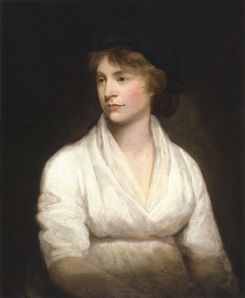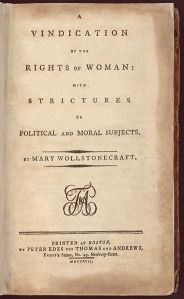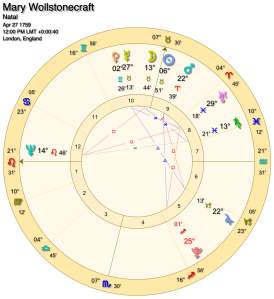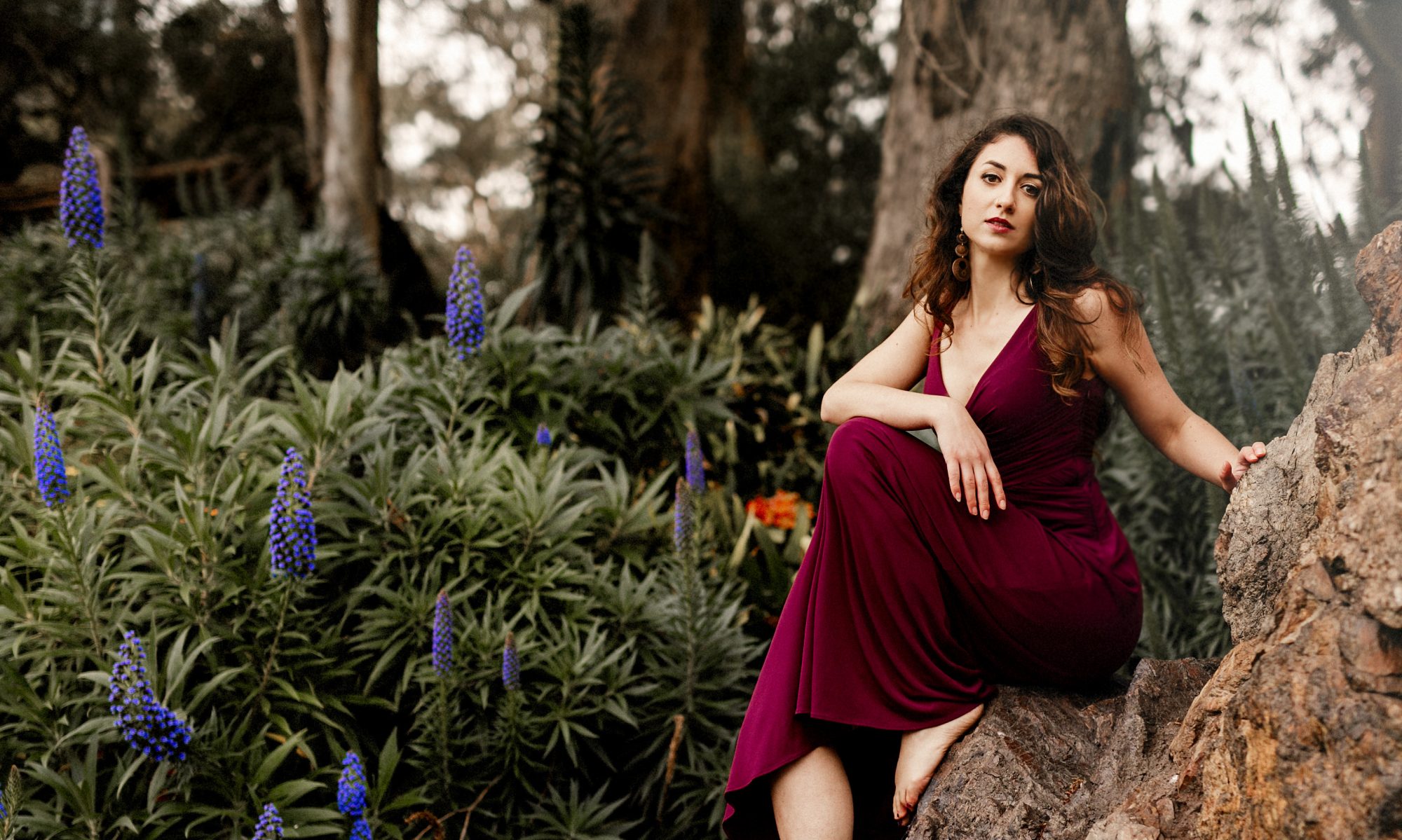“For if it be allowed that women were destined by Providence to acquire human virtues, and by the exercise of their understandings, that stability of character which is the firmest ground to rest our future hopes upon, they must be permitted to turn to the fountain of light, and not forced to shape their course by the twinkling of a mere satellite.”[1]
– Mary Wollstonecraft
The role of women in 18th century England was constrained almost solely to the realm of marriage and motherhood, and few women had the means to raise their voices in protection of their rights. Yet one woman, Mary Wollstonecraft, had a voice so powerful that she is considered by many to have been the first feminist to rise out of Europe. In her emphatic treatise Vindication of the Rights of Woman, Wollstonecraft speaks out with little restraint about her thoughts on women’s education, women’s duties as mothers and wives, and women’s roles and rights in society. She opens her book with a letter bearing her primary argument:
Contending for the rights of women, my main argument is built on this simple principle, that if she be not prepared by education to become the companion of man, she will stop the progress of knowledge, for truth must be common to all, or it will be inefficacious with respect to its influence on general practice. And how can woman be expected to co-operate, unless she know why she ought to be virtuous?[2]
 Wollstonecraft’s writing carries tremendous force and is often punctuated by words and phrases penned entirely in capital letters, driving her point and opinion home. “The rights of woman may be respected, if it be fully proved that reason calls for this respect, and loudly demands justice for one half of the human race.”[3] She steps out of her era’s convention of using the term “Man” to refer to “Humanity,” instead emphasizing that there is a half of the human race who has been made invisible by the very language that describes their species. As Janet Bukovinsky Teacher writes, “No English-speaking woman had ever been so audacious as to question the validity of marriage as she did, or to suggest that men might be preventing women from pursuing their rightful place in society.”[4] Wollstonecraft held radical views not only on women’s rights, but also on divorce and even abortion. Vindication of the Rights of Woman was published during the period of the French Revolution, and in many ways Wollstonecraft is carrying much of the revolutionary energy of the times and channeling it into the transformative power of her words.
Wollstonecraft’s writing carries tremendous force and is often punctuated by words and phrases penned entirely in capital letters, driving her point and opinion home. “The rights of woman may be respected, if it be fully proved that reason calls for this respect, and loudly demands justice for one half of the human race.”[3] She steps out of her era’s convention of using the term “Man” to refer to “Humanity,” instead emphasizing that there is a half of the human race who has been made invisible by the very language that describes their species. As Janet Bukovinsky Teacher writes, “No English-speaking woman had ever been so audacious as to question the validity of marriage as she did, or to suggest that men might be preventing women from pursuing their rightful place in society.”[4] Wollstonecraft held radical views not only on women’s rights, but also on divorce and even abortion. Vindication of the Rights of Woman was published during the period of the French Revolution, and in many ways Wollstonecraft is carrying much of the revolutionary energy of the times and channeling it into the transformative power of her words.
The primary focus of Wollstonecraft’s treatise on women’s rights is the manner in which women were educated in her time. Women’s education consisted almost exclusively of learning the arts to acquire a husband, and did little to develop women’s reason, understanding, sense of virtue, and physical strength. The prime target of her rebuttal is Jean-Jacques Rousseau, who argued in his treatise Emile, or On Education that men and women ought to be educated in entirely different manners because of their fundamentally different natures. Rousseau writes of women and men, saying,
In what they have in common, they are equal. Where they differ, they are not comparable. A perfect woman and a perfect man ought not to resemble each other in mind any more than in looks, and perfection is not susceptible of more or less. In the union of the sexes each contributes equally to the common aim, but not in the same way. From this diversity arises the first assignable difference in the moral relations of the two sexes.[5]
While Rousseau does not go on the unfold what he means by “In what they have in common, they are equal,” he does argue that women should be “passive and weak,” and should “put up little resistance” because they are “made specially to please man.”[6] In Wollstonecraft’s paraphrase of Rousseau’s argument, he goes on to say
that a woman should never, for a moment feel herself independent, that she should be governed by fear to exercise her natural cunning, and made a coquettish slave in order to render her a more alluring object of desire, a sweeter companion to man, whenever he chooses to relax himself.[7]
Wollstonecraft brings forward the many ways this limited and constraining view on women’s education and capabilities is detrimental not only to women but to the society as a whole. If a woman is kept ignorant by her education of all subjects except how to adorn herself to attract a husband, how will she be able to educate her children? Her ignorance will then pass on to her children who will comprise the next generation of individuals structuring society.
The patriarchal logic behind keeping women ignorant was in part based upon the idea that if women were ignorant they might remain innocent of the world’s hardships, and therefore be virtuous. But Wollstonecraft argues that pure innocence is only to be valued in children, not adult women, and that “Women are not allowed to have sufficient strength of mind to acquire what really deserves the name of virtue.”[8] It is the faculty of reason that allows human beings to move toward virtue. She goes on to say “In fact, it is a farce to call any being virtuous whose virtues do not result from the exercise of its own reason.”[9] Later in the treatise Wollstonecraft returns to the relationship of reason to virtue when she writes,
But it is vain to attempt to keep the heart pure, unless the head is furnished with ideas, and set to work to compare them, in order, to acquire judgment, by generalizing simple ones; and modesty by making the understanding damp the sensibility.[10]
In Wollstonecraft’s time an unmarried woman’s honor was based not upon her ability to think, to engage in intelligent conversation, or on her personal accomplishments, but almost solely upon her chastity. Wollstonecraft addresses this notion with disgust, saying, “Nay the honour of a woman is not made even to depend on her will.”[11] Yet she argues that if a woman’s education is focused so exclusively on the arts that will win her a husband, then how can she help but be promiscuous once she is married? She will have been prepared for nothing but a fanciful notion of romance that will soon fade as her husband realizes she can do little else but be the coquettish slave of Rousseau’s fantasies. And to men like Rousseau she says,
The man who can be contented to live with a pretty useful companion without a mind, has lost in voluptuous gratifications a taste for more refined enjoyments; he has never felt the calm satisfaction that refreshes the parched heart, like the silent dew of heaven—of being beloved by one who could understand him.[12]
It is not surprising that much of the backlash against Vindication of the Rights of Woman came not from men but from women who saw themselves targeted by Wollstonecraft’s harsh criticisms. Women adept at the arts to which their curtailed education disposed them would have found Wollstonecraft’s arguments disturbing, insulting, and even threatening. Yet Wollstonecraft insists that it is not the nature of woman that confines her to such narrow forms of expression but rather the conditioning impressed upon her from childhood.
In a woman’s education “Strength and usefulness are sacrificed to beauty.”[13] An interest in beauty and ways of dress are not inherent to women but rather the only interests that have been cultivated by their education. Wollstonecraft argues that it is no more natural for a woman to be exclusively interested in her own beauty than “false ambition” is natural to men. Rather, both are driven by a love for power. For women the only means to gain power is through marriage, therefore physical beauty becomes their only fully developed faculty. “Taught from their infancy that beauty is woman’s sceptre, the mind shapes itself to the body, and, roaming round its gilt cage, only seeks to adorn its prison.”[14] Wollstonecraft goes on to describe how a woman’s education saps her character until she is reduced to the physically and mentally weakened dependent creature men tell her she is.
Every thing that [women] see or hear serves to fix impressions, call forth emotions, and associate ideas, that give a sexual character to the mind. False notions of beauty and delicacy stop the growth of their limbs and produce a sickly soreness, rather than a delicacy of organs; and thus weakened by being employed in unfolding instead of examining the first associations, forced on them by every surrounding object, how can they attain the vigour necessary to enable them to throw off their factitious character?—where find strength to recur to reason and rise superior to a system of oppression, that blasts the fair promises of spring?[15]
Wollstonecraft eventually makes clear that it is the collective oppression by men that has kept women so constrained for countless centuries. The general assumption of her era was that women’s overall inferiority to men was a fact, an issue which Wollstonecraft challenges vigorously. She writes that if women indeed are inferior to men, which she does not concede then, in her words,
I shall only insist, that men have increased that inferiority till women are almost sunk below the standard of rational creatures. Let their faculties have room to unfold, and their virtues to gain strength, and then determine where the whole sex must stand in the intellectual scale.[16]
Only tyrants and sensualists, Wollstonecraft insists, would want women to be oppressed to the level of blindly obedient slaves.
Strengthen the female mind by enlarging it, and there will be an end to blind obedience; but, as blind obedience is ever sought for by power, tyrants and sensualists are in the right when they endeavour to keep women in the dark, because the former only want slaves, and the latter a plaything.[17]
Wollstonecraft goes on to ask why men would want blind obedience when rationally developed principles would ensure a more just and virtuous society. She even likens the oppression of women to that of enslaved Africans, seeming to call for revolutionary reform on both fronts in society.
Why subject [woman] to propriety—blind propriety, if she be capable of acting from a nobler spring, if she be an heir of immortality? Is sugar always to be produced by vital blood? Is one half of the human species, like the poor African slaves, to be subject to prejudices that brutalize them, when principles would be a surer guard only to sweeten the cup of man?[18]
Finally, Wollstonecraft calls upon God, the creator of the universe, to answer for the condition of women:
Gracious creator of the whole human race! hast thou created such a being as woman, who can trace thy wisdom in thy works, and feel that thou alone art by thy nature, exalted above her—for no better purpose? Can she believe that she was only made to submit to man her equal; a being, who, like her, was sent into the world to acquire virtue? Can she consent to be occupied merely to please him; merely to adorn the earth, when her soul is capable of rising to thee? And can she rest supinely dependent on man for reason, when she ought to mount with him the arduous steps of knowledge?[19]
Wollstonecraft had fully extricated herself from the false webs of deceit that continuously told women that their inferior position in society was based upon man’s God-given right for domination.
Much of Vindication of the Rights of Woman is dedicated to looking at the affect of women’s rights and education upon marriage and family. Wollstonecraft held the opinion that a marriage should be based not on passionate love, which she saw as transitory and fickle, but rather upon mutual respect and friendship. She believes that “a master and mistress of a family ought not to continue to love each other with passion.”[20] Marriage, in Wollstonecraft’s opinion, is primarily in service of raising a family and educating children to enter the world, an idea that seems very much at odds with contemporary liberal views on marriage. For Wollstonecraft, “Love is. . . an arbitrary passion.”[21] Yet she also goes on to say that “Supposing, however, for a moment, that women were, in some future revolution of time, to become, what I sincerely wish them to be, even love would acquire more serious dignity, and be purified in its own fires.”[22] Love can only be pure and dignified if first both parties can approach each other as equals.
 I would like to briefly touch upon some aspects of Mary Wollstonecraft’s astrological chart that can further illuminate her character and writings. Wollstonecraft was born at the new moon and therefore has a Sun-Moon conjunction in her natal chart. Simply put, the archetypal energy of the Sun relates to one’s central identity and focus, the areas in which one shines in one’s lifetime. The archetype of the Moon, on the other hand, carries the aspects of one’s emotions and feelings, and one’s ability to nurture, care for, and nourish in relationship. The Moon is particularly connected to the mother-child relationship, as well as the physical body. In the patriarchal West, especially during Wollstonecraft’s lifetime, the solar principle was strongly appropriated by the cultural role held by men, while women were usually dominant in the lunar home realm with little room to step into a solar identity in the world. Wollstonecraft’s Sun-Moon conjunction seems to express itself through her impulse to shine a light on the rights of women who have been operating almost exclusively in the realm of the home in the primary role of motherhood. Wollstonecraft is bringing the solar focus of her inquiry into the lunar realm, and encouraging women to step out into their individual solar power.
I would like to briefly touch upon some aspects of Mary Wollstonecraft’s astrological chart that can further illuminate her character and writings. Wollstonecraft was born at the new moon and therefore has a Sun-Moon conjunction in her natal chart. Simply put, the archetypal energy of the Sun relates to one’s central identity and focus, the areas in which one shines in one’s lifetime. The archetype of the Moon, on the other hand, carries the aspects of one’s emotions and feelings, and one’s ability to nurture, care for, and nourish in relationship. The Moon is particularly connected to the mother-child relationship, as well as the physical body. In the patriarchal West, especially during Wollstonecraft’s lifetime, the solar principle was strongly appropriated by the cultural role held by men, while women were usually dominant in the lunar home realm with little room to step into a solar identity in the world. Wollstonecraft’s Sun-Moon conjunction seems to express itself through her impulse to shine a light on the rights of women who have been operating almost exclusively in the realm of the home in the primary role of motherhood. Wollstonecraft is bringing the solar focus of her inquiry into the lunar realm, and encouraging women to step out into their individual solar power.
Wollstonecraft is also born with Uranus square Pluto in her natal chart; the archetypal expression of Uranus relates to the revolutionary impulse for creative breakthrough, liberation, and change, while the archetype of Pluto is connected to power, evolution, and transformation, to what is oppressed and repressed, and to massive scale and tectonic movement. Interestingly, Wollstonecraft published Vindication of the Rights of Woman in 1792, at the same time the French Revolution was raging across the Channel, when Uranus was opposing Pluto in the world transits. She is expressing this powerful revolutionary energy in the tremendous force of her words which are explicitly calling for mass liberation of women from the oppression of patriarchy. She writes, “It is time to effect a revolution in female manners, time to restore to them their lost dignity, and make them, as a part of the human species, labour by reforming themselves to reform the world.”[23] The Uranus-Pluto opposition of the late 18th century—the next axial alignment of those two planets after the square in the sky when Wollstonecraft was born—was in a transiting T-square to Wollstonecraft’s natal Moon. This transit perfectly correlates with her bringing mass revolutionary energy into the lunar realms of home and motherhood and calling for women to transform their relationships with their minds, bodies, children, and husbands. She writes that a woman’s first duty is to herself and her second is to her children, a reversal of what most women in her time were raised to believe: “Speaking of women at large, their first duty is to themselves as rational creatures, and the next, in point of importance, as citizens, is that, which includes so many, of a mother.”[24]
Finally, Wollstonecraft also calls on women to respect the female body into which they were born, acknowledging their ability to grow as individuals and move toward virtue, rationality, and goodness. “She who can discern the dawn of immortality, in the streaks that shoot athwart the misty night of ignorance, promising a clearer day, will respect, as a sacred temple, the body that enshrines such an improvable soul.” For women today, Wollstonecraft’s words have opened up many doorways that were long closed to those of female gender. Yet I cannot help but wonder, now that we are once again in a period when Uranus and Pluto are in axial alignment, what greater revolutions on behalf of women would a Mary Wollstonecraft of today call upon us to enact?
To read A Vindication of the Rights of Woman the kindle edition is free and available here.
For further reading on Mary Wollstonecraft an interesting blog entitled Vindications of the Rights of Mary is available here.
Works Cited
Rousseau, Jean-Jacques. Emile or On Education. Translated by Allan Bloom. New York, NY: Basic Books, 1979.
Teacher, Janet Bukovinsky. Women of Words: A Personal Introduction to Thirty-Five Important Writers. Philadelphia, PA: Courage Books, 1994.
Wollstonecraft, Mary. Vindication of the Rights of Woman (Kindle Edition), 1792.
[1] Mary Wollstonecraft, Vindication of the Rights of Woman (Kindle Edition), 1792, Ch 2.
[2] Wollstonecraft, Vindication of the Rights of Woman, Section: “To M. Talleyrand Perigord, Late Bishop of Autun.”
[3] Wollstonecraft, Vindication of the Rights of Woman, Section: “To M. Talleyrand Perigord, Late Bishop of Autun.”
[4] Janet Bukovinsky Teacher, Women of Words: A Personal Introduction to Thirty-Five Important Writers (Philadelphia, PA: Courage Books, 1994), 7.
[5] Jean-Jacques Rousseau, Emile or On Education, trans. Allan Bloom (New York, NY: Basic Books, 1979), 358.
[6] Rousseau, Emile or On Education, 358.
[7] Wollstonecraft, Vindication of the Rights of Woman, Ch. 2.
[8] Wollstonecraft, Vindication of the Rights of Woman, Ch. 2.
[9] Ibid.
[10] Ibid, Ch. 7.
[11] Ibid, Ch. 4.
[12] Wollstonecraft, Vindication of the Rights of Woman, Ch. 5.
[13] Ibid, Ch. 2.
[14] Ibid, Ch. 3.
[15] Wollstonecraft, Vindication of the Rights of Woman, Ch. 6.
[16] Ibid, Ch. 2.
[17] Wollstonecraft, Vindication of the Rights of Woman, Ch. 2.
[18] Ibid, Ch. 9.
[19] Wollstonecraft, Vindication of the Rights of Woman, Ch. 4.
[20] Ibid, Ch. 2.
[21] Ibid, Ch. 6.
[22] Ibid.
[23] Wollstonecraft, Vindication of the Rights of Woman, Ch. 3.
[24] Ibid, Ch. 9.

Becca,
I loved your essay on Mary Wollstonecraft. I really think you’ll have a great volume on all the women writers you read and blog about over these next years. (But just keeping your focus on one blog post at a time will probably make it much more do-able energetically.)
I also was very much struck by how both the first quotation you gave (as epigraph) to your essay and the last one — the first one on women being allowed to turn to the Sun (the fountain of light) and not only the Moon (the satellite), and the last quote (on �She who can discern the dawn of immortality, in the streaks that shoot athwart the misty night of ignorance, promising a clearer day, will respect, as a sacred temple, the body that enshrines such an improvable soul�) are great expressions of a kind of primordial pioneer feminist Uranus-Pluto statement of the Sun-Moon archetypal complex.
Love, Dad